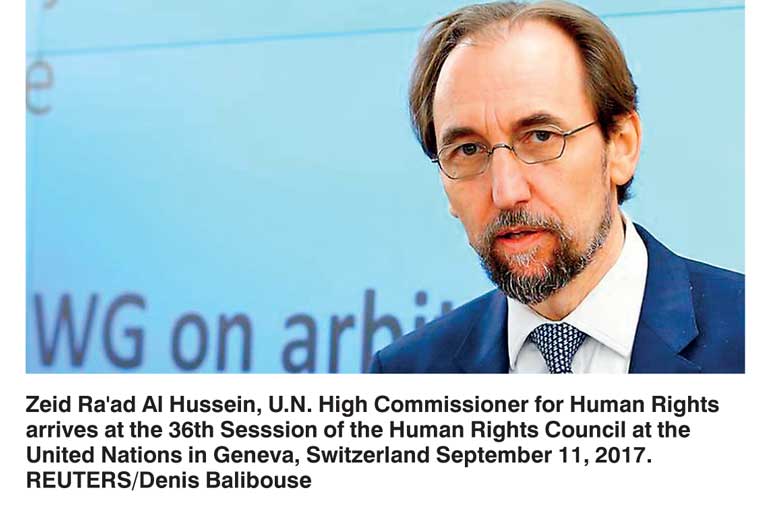Friday Feb 20, 2026
Friday Feb 20, 2026
Tuesday, 19 December 2017 00:33 - - {{hitsCtrl.values.hits}}

GENEVA (Reuters): The top UN human rights official has said he would not be surprised if a court one day ruled that acts of genocide had been committed against the Rohingya Muslim minority in Myanmar, according to a television interview to be shown on Monday.
UN High Commissioner for Human Rights Zeid Ra’ad al-Hussein told the BBC that attacks on the Rohingya had been “well thought out and planned” and he had asked Myanmar’s leader Aung San Suu Kyi to do more to stop the military action.
Zeid has already called the campaign “a textbook example of ethnic cleansing” and asked rhetorically if anyone could rule out “elements of genocide”, but his latest remarks put the case plainly, toughening his stance.
“The elements suggest you cannot rule out the possibility that acts of genocide have been committed,” he said, according to excerpts of his interview provided in advance by the BBC.
“It’s very hard to establish because the thresholds are high,” he said. “But it wouldn’t surprise me in the future if the court were to make such a finding on the basis of what we see.”
Myanmar denies committing atrocities against the Rohingya and has previously rejected UN criticism for its “politicisation and partiality”. The Myanmar military says the crackdown is a legitimate counter-insurgency operation.
Zeid said Myanmar’s “flippant” response to the serious concerns of the international community made him fear the current crisis “could just be the opening phases of something much worse”.
He told the BBC he feared jihadi groups could form in the huge refugee camps in Bangladesh and even launch attacks in Myanmar, perhaps targeting Buddhist temples there.
He did not say, in the excerpts provided, which court could prosecute suspected atrocities. Myanmar is not a member of the International Criminal Court, so referral to that court could be done only by the UN Security Council. But Myanmar’s ally China could veto such a referral.
The United Nations defines genocide as acts meant to destroy a national, ethnic, racial or religious group in whole or in part. Such a designation is rare under international law, but has been used in contexts including Bosnia, Sudan and an Islamic State campaign against the Yazidi communities in Iraq and Syria.
Almost 870,000 Rohingya have fled to Bangladesh, including about 660,000 who arrived after Aug. 25, when Rohingya militants attacked security posts and the Myanmar army launched a counter-offensive.
UN investigators have heard Rohingya testimony of a “consistent, methodical pattern of killings, torture, rape and arson”.
Zeid said he had phoned Suu Kyi in January, asking her in vain to stop the the military operation.
Nobel peace laureate Suu Kyi’s less than two-year old civilian government has faced heavy international criticism for its response to the crisis, though it has no control over the generals it has to share power with under Myanmar’s transition after decades of military rule.